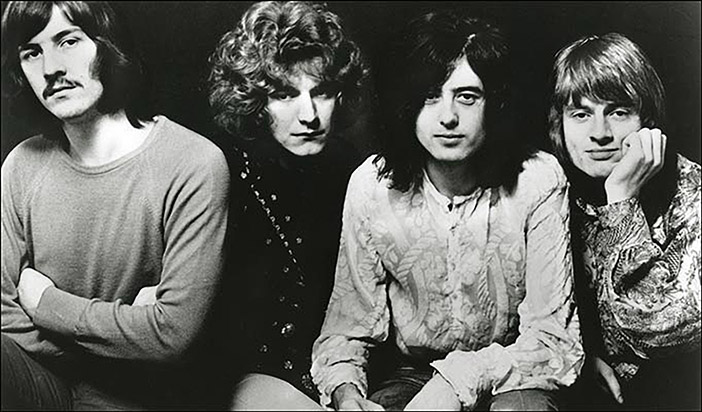In the discussion of music, numerous names are tossed around. Sure, there are many recording artists who are worthy of some level of research. But then there are those names that are worthy of intense MusicStudy. These are the Marquee Names…
Considering the approaches that some new beatmakers are increasingly taking to hip hop/rap music and beatmaking, specifically, the approach to beatmaking through the guise of other music traditions, I can’t help but be reminded of the brilliance of Led Zeppelin. Instead of trying to change the blues to fit rock ‘n’ roll, Led Zeppelin used the blues as their core musical influence to formulate their own sound, a sound that helped usher in a new dimension in rock ‘n’ roll in the late 1960s/early 1970s. In Led Zeppelin’s musical example, I find a good lesson for beatmakers, particularly those who attempt to interpret hip hop/rap music and beatmaking not from its own perspective and on its own foundation but from the perspective and foundation of other music traditions.
A fellow musician and music history enthusiast once said to me that the “brilliance of Led Zeppelin was due to their firm understanding and grasp of rock ‘n’ roll.” My reply? Sure, Led Zeppelin had a great grasp of rock ‘n’ roll, but in my view, their brilliance was, above all, due to their embrace of and commitment to the Black American blues music tradition. What made Led Zeppelin’s music so distinguishable was, in great part, each members’ affection and admiration for, and deference to, the blues. Musically speaking, the members of Led Zeppelin were less interested in early 1960s rock; they were more into 1940s and 50s blues and the aesthetic preferences that it carried with it. Led Zeppelin’s unique sound was the result of their approach to playing—fundamentally—the blues; rock ‘n’ roll was a secondary aesthetic for them. Indeed, early on they did not draw their core ideas from rock ‘n’ roll, they drew heavily from the blues. The blues
was the core musical influence and inspiration for their first couple of albums, most notably Led Zeppelin I.
Since Led Zeppelin’s arrival in 1968, there have no doubt been other rock bands who have drawn from the blues (The Rolling Stones also drew from the blues, at least in their beginning). But in many of those cases, those bands approached the blues through the perspective and prism of rock ‘n’ roll rather than through the perspective, prism, and sensibility of the blues. Here, Led Zeppelin stands out again, because their approach proceeded from the foundation of the blues outward. That is to say, they approached the blues from its own tradition rather than trying to interpret it through the guise of another tradition, a common mistake some beatmakers make by trying to look at hip hop/rap music and the art of beatmaking through the lens of other music forms and traditions rather than first coming to terms with hip hop/rap music’s and beatmaking’s own perspective and sensibility.
The Takeaway
Despite your ultimate musical goals, if you are intent on effectively using elements of a particular music tradition — in this case, the hip hop/rap music and beatmaking traditions — then, clearly, you should go about learning at least the fundamental elements and aesthetic priorities of that tradition. You should not settle for, or attempt to create, misguided interpretations of the tradition’s fundamentals —misinterpretations, I should add, that are based on perspectives outside of the tradition you purport to use.
Finally, there’s one more thing that should be addressed here, it’s about sampling and non-sampling. There is absolutely nothing wrong with either sample-based or non-sample-based beats. Both styles are well-represented and supported within the hip hop/rap music and beatmaking traditions. However, beatmakers who dismiss the art of sampling as a second-rate, non-creative process also disrespect the foundation of the hip hop/rap music and beatmaking traditions. Further, such dismissals discount the inherent value of MusicStudy that sampling offers. In fact, for many people, groups like Led Zeppelin, and the music gateway that they provide, would be missed, were it not for the curiosity in new music that sampling processes like diggin’ in the crates often provokes.
The music and videos below are presented here for the purpose of scholarship.
Check out Led Zeppelin’s commitment to the blues tradition. Their use of repetition and delta blues-inspired rhythm and lyrics would become paramount factors in their ultra successful and influential music career. Enjoy this rare footage of a stripped down Zeppelin in rare form.
Led Zeppelin – “I Can’t Quit You Baby”
Led Zeppelin -“Whole Lotta Love”
Led Zeppelin – “Dazed and Confused;” Lost Performances [early performance, ca. 1969]
